Climate Change Management
Climate Change Management Strategies
PTG is committed to sustainable business practices, emphasizing climate change management in alignment with the United Nations Sustainable Development Goals (SDGs) and international standards. The company has established a robust system for collecting and calculating greenhouse gas emissions from its business activities. This data serves as a foundation for enhancing operational efficiency, setting clear organizational targets for reducing emissions. In addition, PTG evaluates the risks and opportunities posed by climate change in line with the Task Force on Climate-related Financial Disclosures (TCFD) recommendations, integrating these insights into its broader risk management framework to ensure readiness and mitigate potential impacts effectively.
In terms of operations, PTG has transitioned to using fuels that optimize vehicle combustion efficiency while increasing its reliance on renewable energy sources to minimize both direct and indirect emissions. The company also actively promotes environmental conservation initiatives, such as carbon sequestration projects through community-based tree planting efforts in collaboration with key stakeholders. PTG raises internal awareness among employees through energy-saving campaigns and discloses its greenhouse gas emissions data transparently to stakeholders. The company follows relevant frameworks, including the 56-1 One Report, Global Reporting Initiative (GRI), and the Dow Jones Sustainability Indices (DJSI), underscoring its commitment to transparency and long-term sustainable business growth..
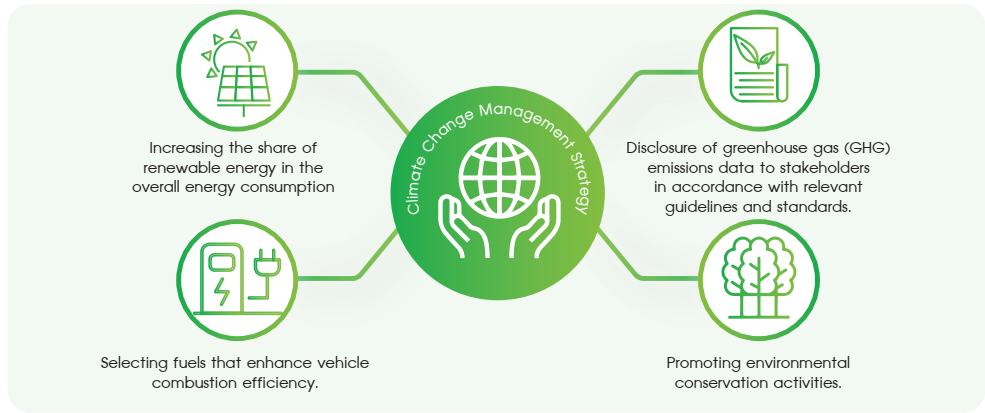
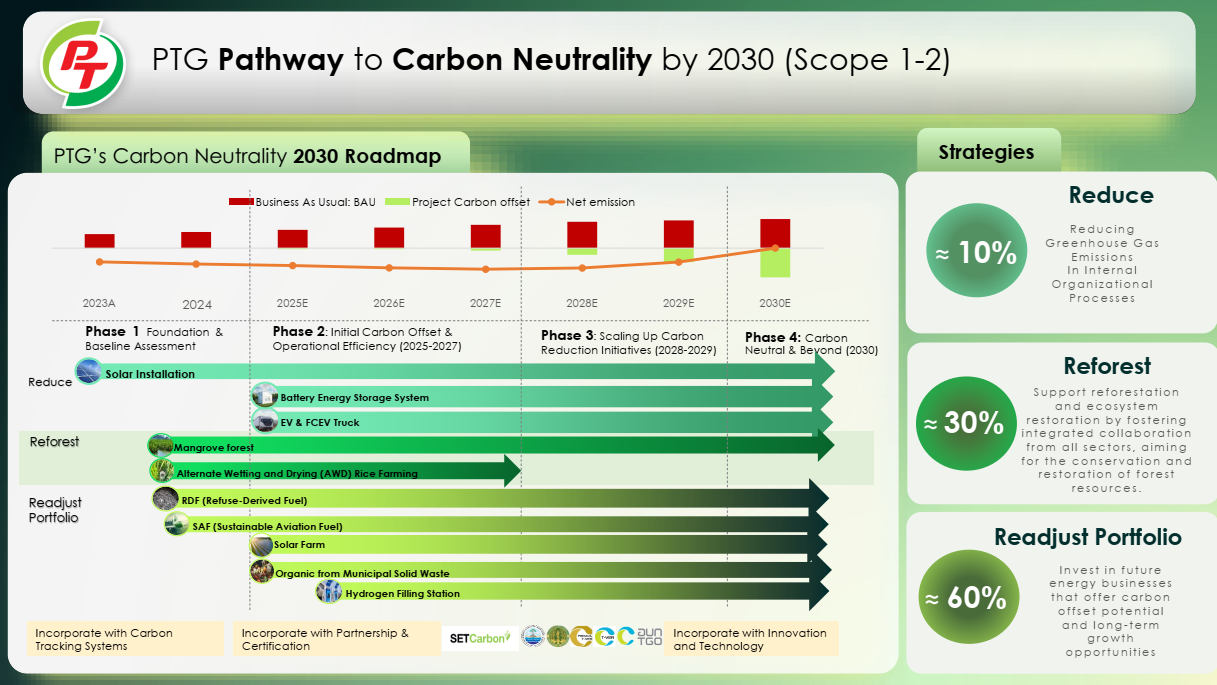
Download Climate Change Management Strategy
Climate Change Risk and Opportunity Analysis
PTG has established a robust climate change risk management framework at the organizational level as part of its overall risk management strategy to drive long-term sustainability. This approach involves proactive risk prevention, adaptation, and the identification of business opportunities emerging from climate change. To effectively oversee climate change risks, the company has appointed a Risk Management Committee, composed of senior executives, and entrusted the Chief of Finance and Sustainability Officer, who is a member of the Board of Directors, with the responsibility of managing climate change risks at the board level. Additionally, a risk management working group is responsible for overseeing various processes related to the organization’s overall risk management. This task force has taken on an expanded role in effectively managing risks related to climate change by integrating them into the organization’s broader risk management strategy.
Climate Change Risk and Opportunity Assessment Approach
PTG evaluates climate change risks and opportunities following the principles set by the Task Force on Climate-related Financial Disclosures (TCFD). This process includes identifying both climate-related risks and opportunities and analyzing potential impacts through scenario modeling based on climate change reports. These scenarios include the Intergovernmental Panel on Climate Change (IPCC) physical scenario RCP8.5, the International Energy Agency (IEA) transition scenario to a low-carbon society (ETP 2DS), and Greenpeace’s transition scenario to a low-carbon society (Greenpeace Advanced Energy [R]evolution). This comprehensive assessment allows for effective management of business impacts from climate change and the development of appropriate mitigation measures.
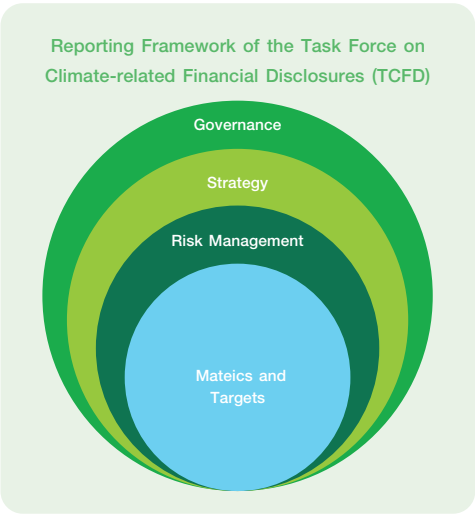
Financial Implications of Climate-Related Risks
TABLE 1
| Risk | Category (TCFD) | Financial Implications | Time Horizon (Short / Medium / Long Term) |
| Natural disaster risk | Physical Risk (Acute) | - Revenue: Potential decline in sales due to business interruptions. - OPEX: Increased operating costs for site restoration, insurance, and employee compensation. |
Short Term |
| Permanent Climate-Related Risk | Physical Risk (Chronic) | - OPEX: Higher operating costs for adaptation measures affecting company assets. | Long Term |
| Policy & Legal Compliance Risk | Transition Risk (Policy & Legal) | - CAPEX: Potential need for additional investments to comply with new regulations, exceeding initial budget. - OPEX: Increased management costs for regulatory compliance. |
Short Term |
| Investment in New Technologies | Transition Risk (Technology) | - CAPEX: Higher capital expenditures (approx. 25–30% over budget) for adopting new technologies. | Medium Term |
| Changing Consumer Behavior | Transition Risk (Market) | - CAPEX: Additional investments in eco-friendly products and services to meet consumer demand. - Revenue: Potential decrease in oil sales, approximately 2.21% of total revenue. |
Medium Term |
| Reputational Risk | Transition Risk (Reputation) | - Revenue: Potential loss of consumer trust and support, leading to decreased sales and shareholder value. - OPEX: Potential fines for non-compliance with environmental regulations. |
Short Term |
Assessment of Climate-Related Opportunities
TABLE 2
| Categories | Climate-Related Opportunities | Forecasted Financial Impacts |
| ResourceEfficiency |
- Reduce electricity usage at offices, warehouses and service stations. - Alternative energy usage, e.g., solar PV installations at service stations. |
- Facilitate electricity savings (OPEX: cost savings) |
| EnergySource |
- Use and invest in clean energy technologies. | - Reduce costs in a long run (OPEX: Green Loan interest rate decreased by approximately 1.5%). - Create new products or innovations which enhance competitiveness. (CAPEX) - Government funding support for environmental investments. (OPEX) |
| Product & Service |
- Design and develop environmentally-friendly products and services in response to changes in consumers’ needs and behaviours. |
- Increase in revenues generated by green products. (Revenue: Revenue from EV Charger electricity sales is 7.15 THB per unit.) - Revenue from Max Card Plus EV (Revenue) - Revenue from RDF project (Revenue) |
| Market | - Penetrate green product and service markets to expand the environmentally conscious group of customers. - Enhance satisfaction of environmentally conscious customers. |
- Enhance competitiveness in the green market. (Revenue) - Attract investors who wish to invest in businesses that place importance on the environment. (Revenue) - Establish a positive reputation for the organisation. (Revenue) - Revenue from Eco-Friendly Glasses (PUN) (Revenue) |
| Resilience | - Participate in green initiatives such as voluntary greenhouse gas mitigation programme based on Thailand’s applicable standards (T-VER) - Incorporate government’s clean energy policies in business operations. |
- Improve responsiveness to climate-related vulnerabilities. (Revenue) - Revenue from the sale of Carbon Credits (based on the assessed period) (Revenue) |
Note:
Revenue refers to the income generated from the company’s business operations.
OPEX (Operating Expenditure) refers to expenses incurred as part of the company’s ongoing operational activities.
CAPEX (Capital Expenditure) refers to expenses related to additional capital investments.
Download Climate-Related Risk Management Report
Download Carbon Footprint for Organization Certificate
Greenhouse Gas Management
Responsive Actions Greenhouse gas management
| GHG Emissions | 2020 | 2021 | 2022 | 2023 | 2024 |
| Scope 1 | 1,209 | 1,582 | 55,771 | 50,718 | 55,159 |
| Scope 2 | 887 | 1,064 | 31,806 | 38,307 | 37,833 |
| Scope 3 | 1,935,022 | 13,799,057 | 20,289,891 | 15,286,932 | 15,431,998 |
| Total | 1,937,118 | 13,801,703 | 20,377,468 | 15,375,957 | 15,524,990 |
1. Unit: Tonnes of carbon dioxide equivalent (TonCO₂e)
2. The data has been collected using the Operational Control approach as specified in the GHG Protocol.
3. Greenhouse gas emission data for 2018-2020 for PTG and the PTG Energy Group has been recalculated based on the Emission Factor from EPPO 2021.
4. The 2020 GHG emissions data covers PTG’s operational sites, including the headquarters and oil depots. In 2021, the emissions calculation scope was expanded to include the transportation segment. In 2022, the scope was further expanded to cover fuel service stations, and in 2023, it was extended to include distribution centers.
5. From 2021 to 2023, the company conducted full reporting of Scope 3 GHG emissions. However, in 2024, the company refined its calculation approach by selecting only the most significant categories to enhance the accuracy and relevance of environmental impact reporting. This approach aligns with the GHG Protocol framework, improving the efficiency and precision of corporate GHG emissions management.
6. The 2024 data, greenhouse gas emissions increased, primarily due to higher fuel consumption in transportation activities.This resulted in an increase in directemissions (Scope 1), which corresponds with a rise in other indirect emissions (Scope 3), driven by the growth in fuel sales volume.
Other Indirect Greenhouse Gas Emissions (Scope 3)
| Other Indirect GHG Emissions (Scope 3) | 2020 | 2021 | 2022 | 2023 | 2024 |
| Category 1 : Purchased goods and services | 203,155 | 1,215,576 | 1,221,141 | 1,382,245 | 1,430,073.07 |
| Category 2 Capital goods | - | - | 18,087 | 32,821 | 10,933.14 |
| Category 3 Fuel-and-energy-related activities | 887 | 1,052 | 434 | 16,088 | 14,790.97 |
| Category 4 Upstream transportation and distribution | 280 | - | 23,878 | 46,721 | 10,481.43 |
| Category 5 Waste generated in operations | - | 45 | 3,376 | 163 | 153.96 |
| Category 6 Business travel | - | - | - | - | 216.46 |
| Category 7 Employee commuting | - | - | - | - | - |
| Category 8 Upstream leased assets | - | - | - | - | - |
| Category 9 Downstream transportation and distribution | - | - | 161,261 | 18,051 | 75,556.95 |
| Category 10 Processing of sold products | - | - | - | - | - |
| Category 11 Use of sold products | 1,730,700 | 8,729,439 | 18,861,693 | 13,790,842 | 15,431,997.70 |
| Category 12 End of life treatment of sold products | - | - | 10 | - | 8,822.74 |
| Category 13 Downstream leased assets | - | - | 9 | - | 7,135.92 |
| Category 14 Franchises | - | - | - | - | - |
| Category 15 Investments | - | - | - | - | - |
Note: The company has expanded its Scope 3 disclosure to cover additional material categories, reflecting the broader impact of its value chain and in response to stakeholder expectations and international ESG assessment standards.
Greenhouse Gas Emissions Reduction Initiatives
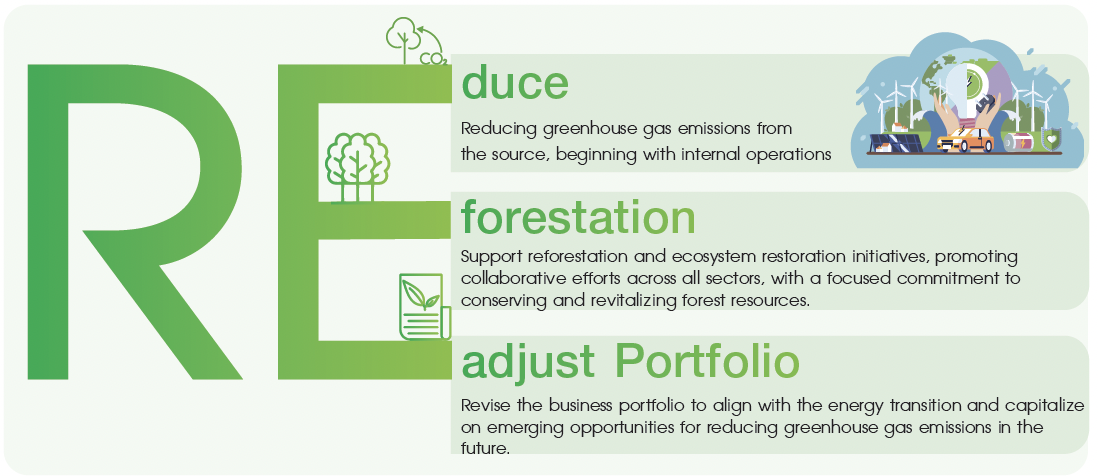
Reduce: PTG is dedicated to reducing greenhouse gas emissions at the source by integrating environmentally friendly practices into its operations. This includes minimizing energy consumption in offices and increasing the use of renewable energy across various sectors. The company also prioritizes resource conservation by reducing paper and plastic use and promoting efficient waste management through recycling initiatives. Furthermore, PTG cultivates a corporate culture focused on sustainability, ensuring all employees are engaged in fostering environmental awareness and responsibility throughout the organization.
- Solar Rooftop project
PTG has shown its strong commitment to promoting clean energy and reducing greenhouse gas emissions through the Solar Rooftop project. Since 2020, the company has been installing solar panels on the rooftops of its gas stations. This initiative is a key part of the company's strategy to minimize environmental impacts while encouraging the adoption of sustainable energy practices within the business sector.
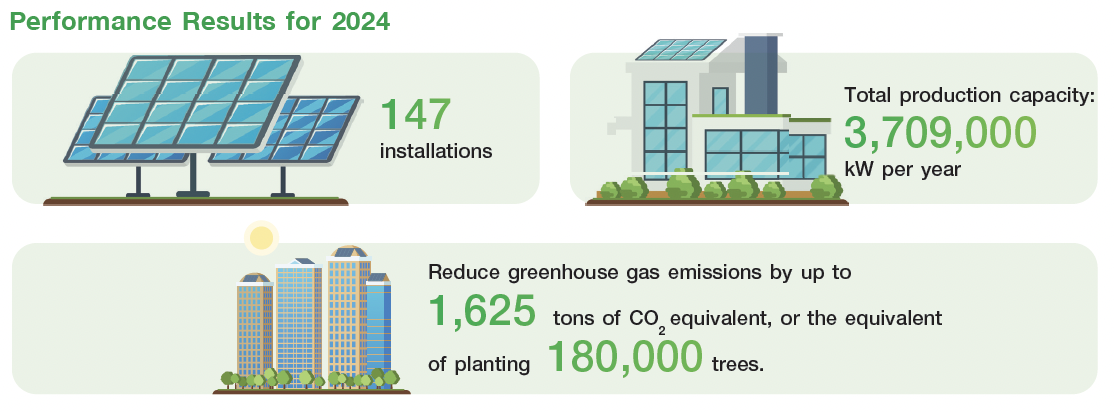
- EV Truck Project
PTG Logistics Co., Ltd., a subsidiary of PTG Energy Public Company Limited, has implemented a project aimed at minimizing the environmental impact of transportation by focusing on reducing greenhouse gas (GHG) emissions and enhancing energy efficiency. A key initiative under this project is the integration of electric trucks (EVs) into the company’s logistics operations as part of a pilot program launched in 2024. As part of this initiative, two EV trucks were deployed to reduce dependency on fossil fuels. Their utilization has resulted in a reduction of fuel consumption by 451 liters, leading to a significant decrease in GHG emissions by 1.235 tons of carbon dioxide equivalent (tCO₂e).This project underscores the company’s commitment to fostering an environmentally sustainable logistics system. Beyond reducing pollution and mitigating climate change impacts, it also serves as a strategic approach to promoting more efficient energy utilization.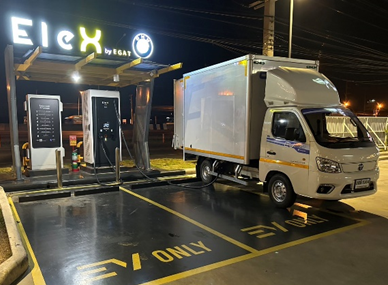
Reforestation: PTG is dedicated to the ongoing support of forest planting and ecosystem restoration, with a strong focus on fostering collaboration across all sectors, including government, private enterprises, and local communities, to ensure long-term sustainability. The company prioritizes the conservation of natural resources and actively promotes initiatives aimed at restoring forest integrity and enhancing environmental sustainability. Furthermore, PTG is committed to raising environmental awareness within society to drive lasting, sustainable outcomes, with the ultimate goal of achieving a balance between development and nature preservation.
- Mangrove Planting Project
The company has participated the Mangrove Forestation Project for Carbon Credit Benefit and signed a Memorandum of Understanding (MoU) with the Department of Marine and Coastal Resources and the Thailand Mangrove Alliance. This initiative aims to foster cross-sector collaboration in the sustainable conservation and restoration of mangrove ecosystems. The project is expected to sequester approximately 2,500 tons of CO2 equivalent, contributing to the national goal of achieving net-zero greenhouse gas emissions. Additionally, it supports the expansion of green spaces, enhances biodiversity, and promotes community livelihoods in mangrove areas, thereby contributing to long-term environmental and community sustainability.
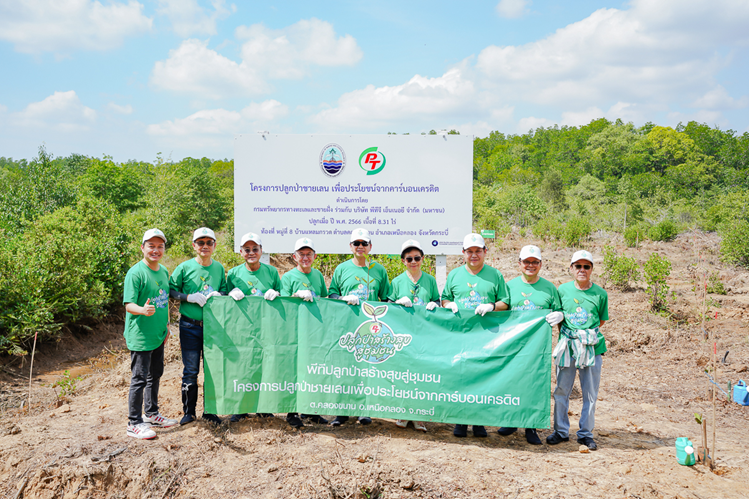
- Tree
Planting Project
The company is dedicated to supporting the restoration and conservation of community ecosystems, working in strong collaboration with the government, community leaders, and local residents. Together, they strive to create environmental sustainability while fostering positive relationships between the company and the local communities.
In 2024, the company initiated several activities to enhance ecosystems around its operational areas, including:
- The "Mangrove Planting for a Balanced and Sustainable World" project at the Chumphon Oil Depot
- The "Plant Trees, Reduce CO2, and Increase Oxygen" project at the Pak Thong Chai Oil Depot
- The "Protect Trees, Combat Global Warming" project at the Phitsanulok Oil Depot
- The "Plant Trees, Increase Oxygen, Green Community" project at the Surin Oil Depot
These initiatives collectively helped to sequester a total of 5.4 tons of CO2 equivalent, contributing to environmental balance and fostering long-term sustainability for the local communities.
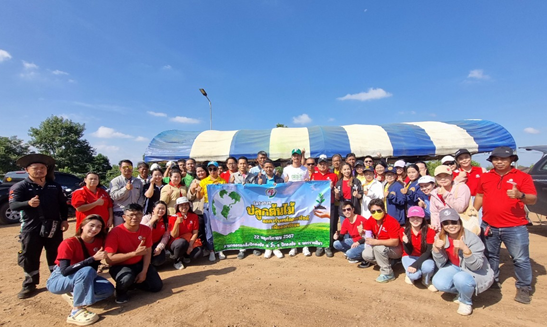
Re-adjust Portfolio: PTG is dedicated to reshaping its business portfolio to align with the energy transition, while seizing new opportunities to reduce greenhouse gas emissions. The Renewable Energy sector has been identified as one of the eight core businesses the company intends to invest in moving forward, aiming to support sustainable growth and generate long-term value.
- RenewableEnergy Business Group
The company’s waste management and community waste-to-energy business not only reduces waste and methane emissions in local communities but also generates up to 6 megawatts of electricity, with commercial operations expected to begin in 2025. In 2024, the company successfully processed over 5,456.72 tons of waste, resulting in a reduction of 12,000 tons of CO2 equivalent—comparable to planting 130,000 trees. Furthermore, the management and production of Refuse-Derived Fuel (RDF) aligns with the company’s vision to enhance the quality of life and sustainability for communities and society through efficient waste management. These accomplishments not only improve public health and the environment but also create opportunities for the company to expand into new, sustainable businesses in the future. - EV Charger Stations
With the rapid growth of electric vehicles (EVs) and the continuous increase in registered EVs, alongside the company’s commitment to meeting customer needs, PTG recognizes the importance of expanding and enhancing its service stations. In response, the company has partnered with the Electricity Generating Authority of Thailand (EGAT) to install EV charging stations to accommodate the growing demand from EV users. By 2024, the company had installed over 190 EV charging stations and aims to expand to 712 stations by 2027. A comprehensive planning and data collection process has been undertaken to identify optimal installation locations across all regions of the country. The company’s strategy is to provide charging stations in key locations, aiming to have an EV charging station every 150-200 kilometers, ensuring convenience and supporting sustainable travel for EV users in the future.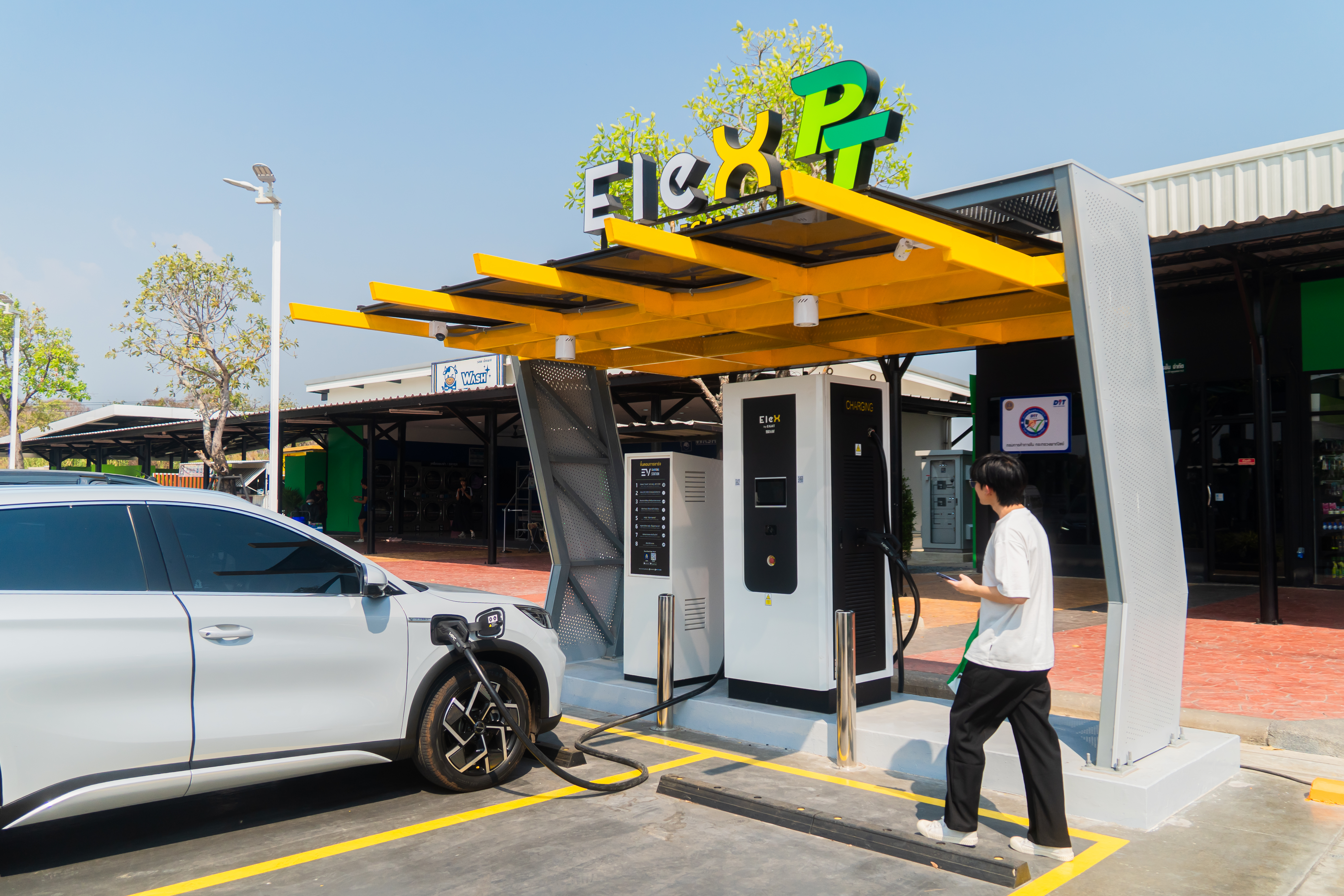
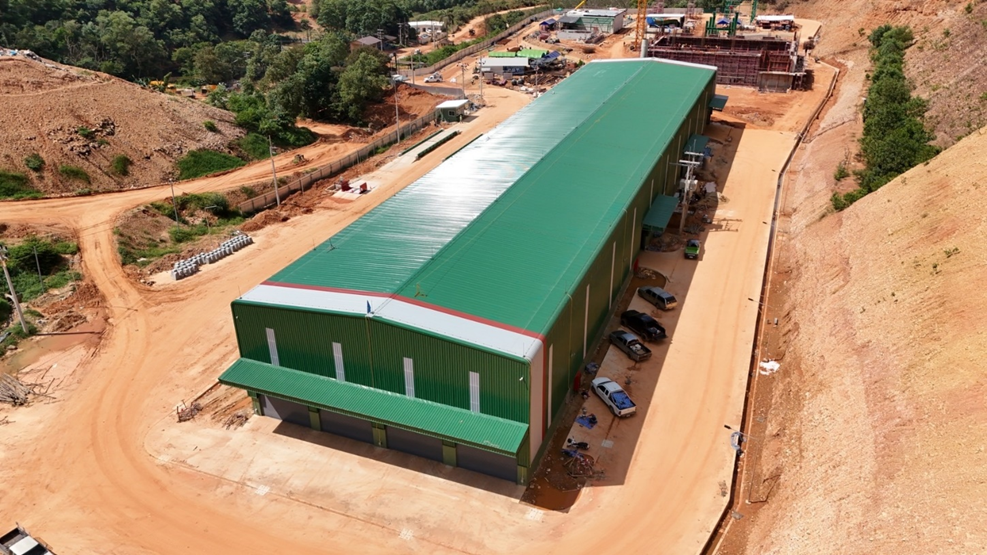
Sustainability Investment and Green Business Revenue
PTG Energy Group has allocated a five-year investment budget (2025–2029) totaling approximately THB 15 billion to support the transition toward clean energy and sustainable growth under the “Carbon Neutral 2030” target. The company is committed to achieving a balanced approach between energy security, carbon emission reduction, and the development of new businesses that align with the organization’s long-term sustainability direction.
PTG has also generated revenue from investments in renewable energy businesses, which are classified as sustainable activities in accordance with the EU Taxonomy framework. In 2024, revenues from such activities accounted for 0.0042% of the Group’s total revenue, respectively. These figures reflect the company’s ongoing efforts to expand its clean energy portfolio and reinforce its environmental commitment, contributing to greenhouse gas reduction across the value chain and supporting sustainable long-term growth.






